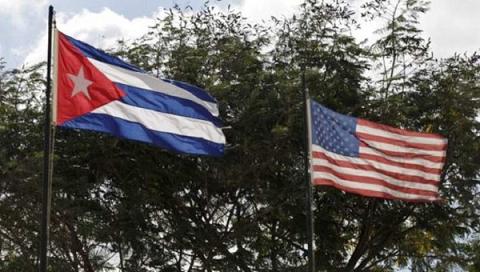Embassies Open, But The US Is No Friend To Havana
This article originally appeared in the Morning Star | Monday, 27 July 2015 | Click here for original article

Cuba Solidarity’s ROB MILLER explains why relations between the superpower and the socialist island are still far from “normalised”
AFTER 54 years the US and Cuba have restored diplomatic relations and opened embassies in Washington and Havana.
Many people may be led to believe that the relationship between the two countries is now “normalised.” In truth, this is a long way off, for while the US may have changed its strategy, its objectives remain the same.
US Secretary of State John Kerry said: “It’s really an opportunity to provide the people of Cuba the possibility of transformation. And I have hope that we can complete this task … We don’t focus on what will the Cuban government do for us, but what we do for Cubans and Americans.”
While Cubans and their supporters welcome any moves towards better relations, the current reality is that the US persists in its aggressive policies towards the island.
It has endured 56 years of attempts to destroy its revolution through US-sponsored terrorism, a CIA-co-ordinated invasion, biological warfare, an illegal blockade and a permanent negative propaganda campaign.
For many years the US has organised and funded anti-Cuban groups inside and outside Cuba. Cuba has made it clear that such practices must stop and that future embassies must function solely on the principles of the Vienna Convention, which demands non-interference in the host country’s internal affairs.
However US Congress recently announced increased funding of $30 million (£19.3m) US dollars for so called “Cuba democracy programmes” — regime-change programmes by another name.
The US persists with its illegal broadcasts into Cuba by Radio and Television Marti, which violate Cuba’s sovereignty and the regulations of the International Telecommunications Union.
There is still a long list of serious outstanding issues, each of which negate notions of a “normalised” relationship.
The US still illegally occupies Guantanamo Bay, where it maintains its naval base and infamous prison camp. It has made clear that this illegal occupation of sovereign Cuban territory is not on the negotiating table.
There are many other issues to resolve, including compensation claims for the effects of the blockade, Cuba-specific migratory policies and the blocking of US tourism to Cuba.
Washington now permits some businesses in the US to engage in commerce with private individuals in Cuba, but makes it illegal to do business with state enterprises on the island. Equally licenced US study groups to Cuba are not permitted to engage with “Cuban government” or “communist” controlled organisations.
However the biggest affront remains the continuing US blockade of the island, which causes such havoc to the possibilities for development of the Cuban economy.
The US State Department makes it clear: “Just to confirm, economic sanctions under OFAC’s Cuban Assets Control regulations will remain in effect and most transactions with Cuba and with Cuban nationals and the government of Cuba will remain prohibited.”
The opening of embassies is the latest positive development but there really is still a long way to go before any “normalised” situation exists. At the same time there are some in the US, including some serious presidential candidates, who would like to reverse the first small steps taken towards an improved relationship.
Barack Obama’s Cuba policy is a huge shift in strategy. “The old policy did not work. It is long past its expiration date,” he said in his State of the Union speech. “When what you’re doing doesn’t work for 50 years, it’s time to try something new.”
Washington believes that business and engagement can do what isolation could not. This is part of the new strategy to force US-style “change” onto the Cuban people.
Like Cuba itself, we should all be alert to Washington’s new policy of engagement. While Cuba looks to develop trade and relations with its giant neighbour, it will at the same time need to be wary. It will have to manage the changes and ensure that Cuban laws prevail. Just as all foreign business ventures have been to date, it must ensure that hoped-for US investment will be equally regulated.
I recently had the opportunity to meet with Josefina Vidal, Cuba’s top diplomat, who has headed up the Cuban delegation throughout the months of negotiations in Washington and Havana. When we met she was calm and assured. It is easy to understand why she appears in such a confident mood. She represents a country that finds itself in a historically strong position vis-a-vis its giant and aggressive superpower neighbour. She heads the negotiations on behalf of a nation that has shown that indomitable spirit over so many years. After all, it was the US that finally came to the negotiating table.
She made clear that Cuba was not about to “roll over” in the face of changes in US policies. Any discussions and subsequent relationship must be based on “principles of mutual respect and understanding.”
While this would appear to be an obvious prerequisite for serious discussions between two nation states, it is not something that the US is used to. Rather, it has spent more than 50 years terrorising its small Caribbean neighbour through a policy of blockade and aggression at every level.
The opening of embassies is another welcome step in the long road towards normalisation. The most important thing is to continue to support and defend Cuba’s sovereignty. We should all applaud moves towards a future where the Cuban people will be allowed to develop their own society based on their own chosen path, rather than one chosen for them by Washington or Miami.
The Cuban Futures conference organised by Cuba Solidarity Campaign and Sertuc International Committee will take place on October 3 at Congress House.
Rob Miller is director of the Cuba Solidarity Campaign.






